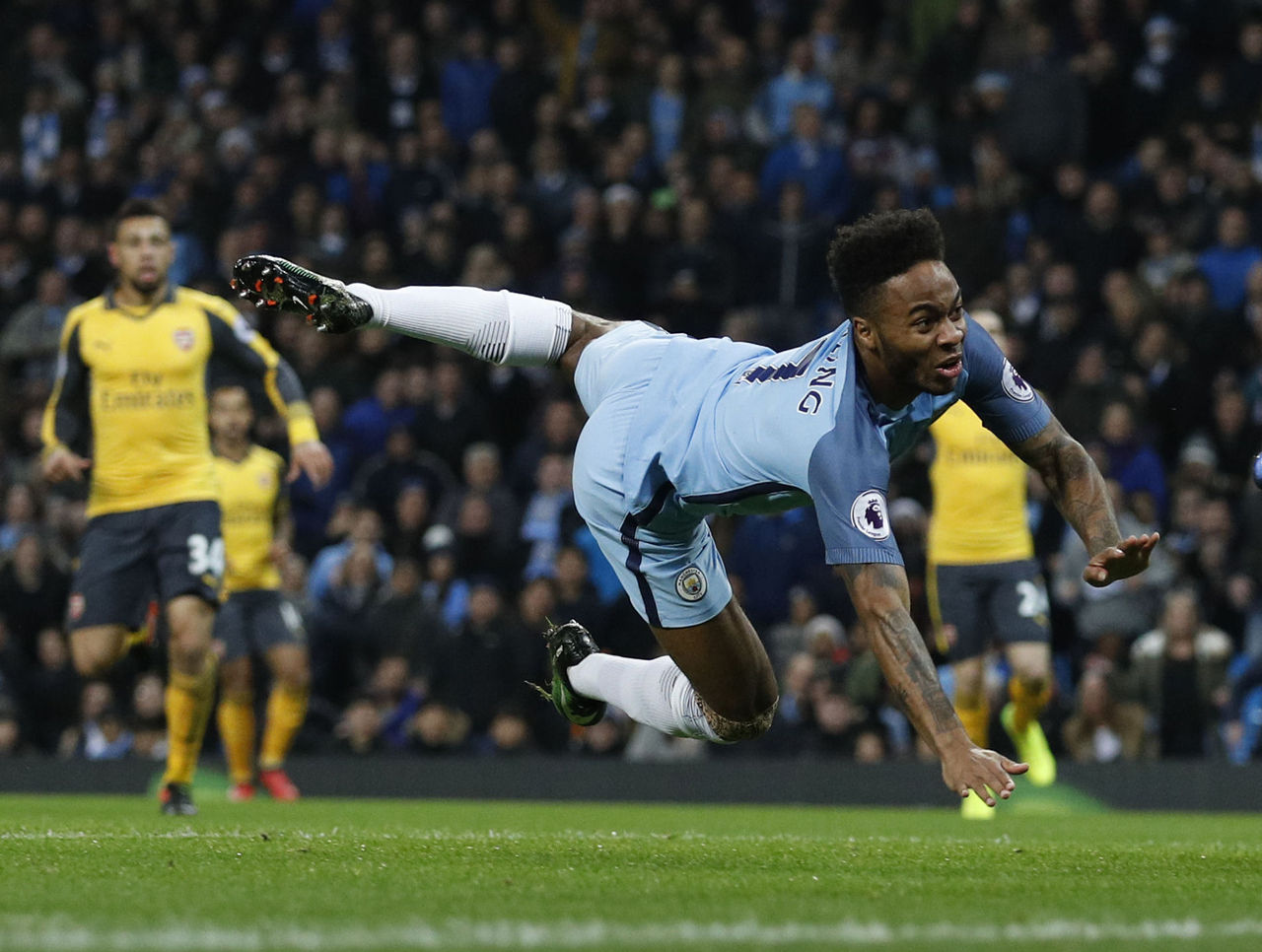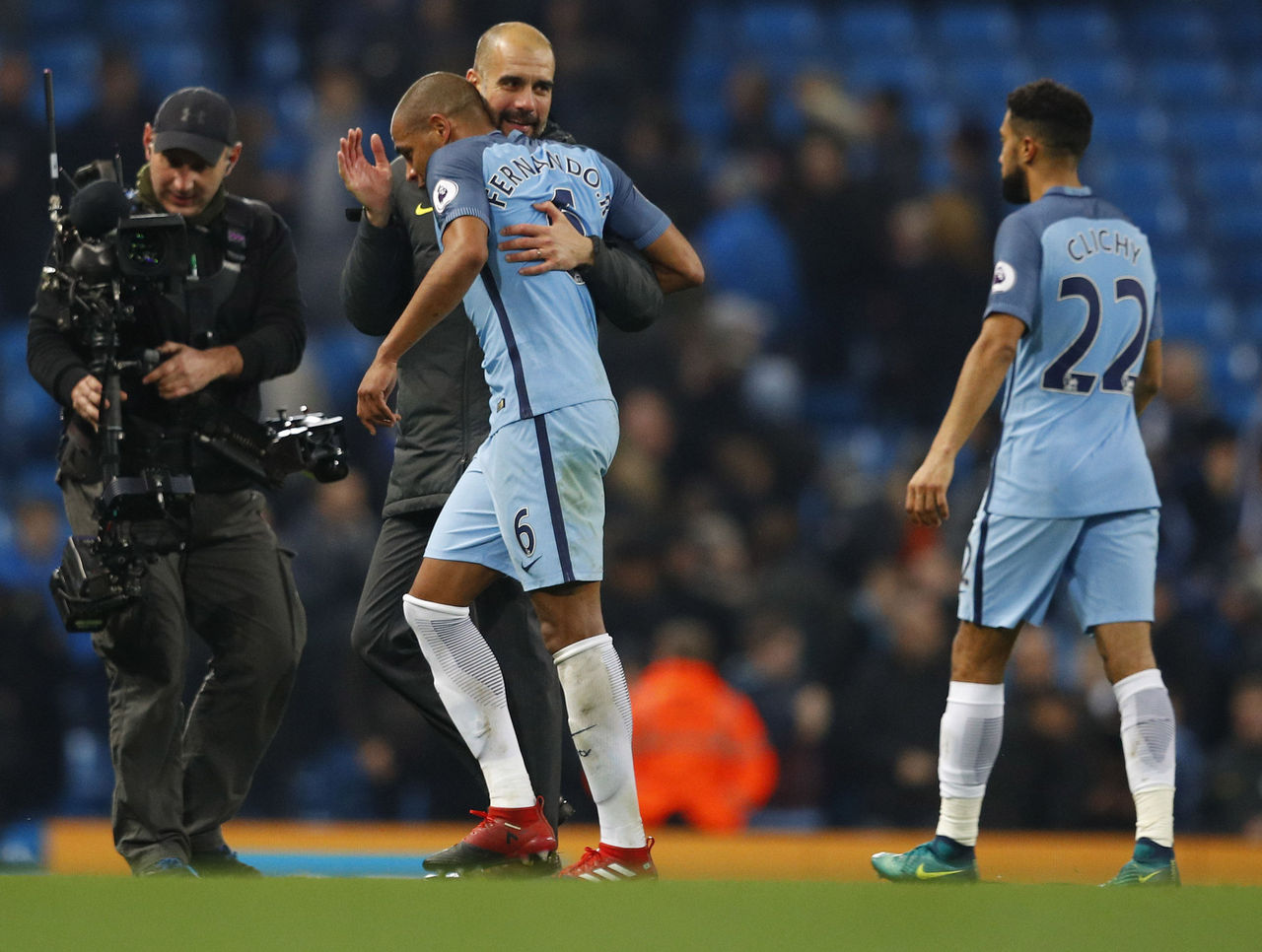How City's supposed weak links led a storming 2nd half
Manchester City didn't take the easy option in Sunday's 2-1 defeat of Arsenal.
Rather than exposing the clear lack of organisation and wanting physicality evident in Arsenal's midweek loss at Everton - the Toffees' two headed goals coming by virtue of nonexistent marking - Pep Guardiola began the contest with a head-scratching selection, then tweaked it at the break, steering his side to a victory that ensures its title pursuit remains on course.
The Spanish tactician's adjustments allowed City to overcome a weakness that predates his tenure, earning the club's first win when going in at the break as the losing side since November 2012, even though he was missing three of his first-choice XI.
Guardiola doesn't have a forward at his disposal who's a strong aerial presence, but the obvious response to the Everton findings would have been fielding Kelechi Iheanacho, the gifted poacher who was expected to take the attacking mantle during Sergio Aguero's suspension.
With the Nigerian closely bordered by Kevin De Bruyne and Raheem Sterling, Guardiola's attack-first principles would've still been at the fore - and the woeful defending that's blighted City's campaign would have a protective line of Fernando, Yaya Toure, and a snappier David Silva ahead of it. A 4-3-3 just seemed logical.
But, as is Pep's way, the setup from the first whistle was baffling. A loose 4-1-4-1 was spearheaded by Sterling, a man who's better at dribbling into space (admittedly sometimes down dead ends) rather than ghosting into it in an Iheanacho-esque fashion. Shortly after Theo Walcott's opener, Sterling's inability to convert a header following a delightful cross from De Bruyne was indicative of a player who tends to frustrate.

It made little sense. Entrusting Sterling with such a central role did not play to his strengths, and contradicted weeks of training at the Etihad Campus that have stressed the importance of him playing with great width to eke out yards in the middle.
What a difference halftime made, though. After the interval, Sterling shifted to the right, Leroy Sane runs began on the left flank and drifted centrally to devastating effect, and De Bruyne operated as a false nine.
Sterling's 71st-minute match-winner was exactly what he should be doing - cutting inside his full-back and pinging an early shot. The finish was ruthless, and the execution of the move - beginning with an exceptional volleyed pass from De Bruyne - was breathtakingly quick. This is the only way Sterling will lose his unfairly large throng of naysayers in the English media.
Related: Sterling sinks Arsenal to reignite Manchester City
Toure, a player whose career at City looked over until his surprise recall under a month ago, was equally impressive. The Ivorian wrote himself into the club's history books through his exploits in his first four years in England, but the following two were tarnished by outings that showed indifference.
Since his return, however, he's played every minute in four matches, all of which City has won. His pace has dwindled, but his strength and composure offer a valuable outlet when his colleagues are looking to recycle possession or reassess a patient, possession-based probe around the opposition's box.
Yaya Toure's contribution for @ManCity
— Sky Sports Statto (@SkySportsStatto) December 18, 2016
111 touches
98 passes, 90% accuracy
1 key pass
1 shot on target
12 times possession gained pic.twitter.com/p6GzTBzMXy
In addition to Aguero's absence through suspension, Fernandinho - the heartbeat of Guardiola's first-choice City XI - was serving the last match of a three-match ban and Ilkay Gundogan was beginning a long-term residency in the treatment room with a serious knee injury.
It was Fernando, then, who was the most withdrawn midfielder.
Compared to Fernandinho and Gundogan, the Brazilian is frankly immobile. The temptation would've been to hide him away in the gap between the midfield and defence, standing on Mesut Ozil and playing the easy sideways passes.
Fernando, like many of his colleagues, won second balls with great regularity (benefiting from the recent training focus that Guardiola revealed to the Guardian's Daniel Taylor post-match), but - again, as is Pep's way - he pushed forward, even making an uncharacteristic dribble down the right flank on one occasion.

This Guardiola era has involved teething pains, but he made no promises about righting this underachieving unit immediately. Something that's quickly become evident, though, is the responsibility he has handed to previously maligned players and his ability to draw previously unforeseen qualities out of them.
From the vital triumph over Arsenal, Sterling's improved use of the flanks, and Fernando and Toure's upgraded maneuvering were telling examples of what Guardiola's already implementing in Eastlands.
He's wringing even more out of players who showed signs of hitting disappointingly low ceilings. Fernando and Toure won't necessarily be a part of City's fresh generation, but they'll be better players for being part of its early stages.